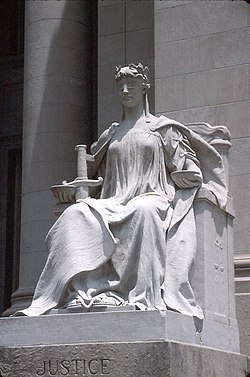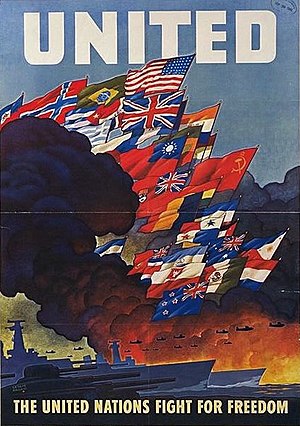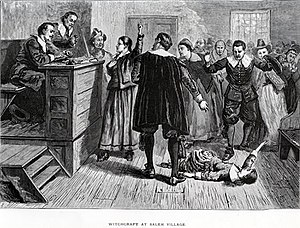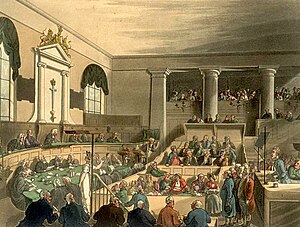Law
Law (from Old English lagu "something laid down or fixed"; legal comes from Latin lex "law")[1] has been defined as a "system of rules",[2] as "any system of regulations to govern the conduct of the people of a community, society or nation",[3] as an "interpretive concept" to achieve justice,[4] as an "authority" to mediate people's interests,[5] and even as "the command of a sovereign, backed by the threat of a sanction".[6]
Laws inform everyday life and society in a wide variety ways, reflected by numerous branches of law. Contract law regulates agreements to exchange goods, services, or anything else of value, so it includes everything from buying a bus ticket to trading swaptions on a derivatives market. Property law defines people's rights and duties towards tangible property, including real estate (= "real property" -- land or buildings) and their other possessions (= "personal property" -- clothes, books, vehicles, and so forth), and intangible property, such as bank accounts and shares of stock. Tort law provides for compensation when someone or their property is harmed, whether in an automobile accident or by defamation of character. Those are fields of civil law, which deals with disputes between individuals. Offenses against a federal, state, or local community itself are the subject of criminal law, which provides for the government to punish the offender. Society itself is built upon law. In the United States, Constitutional law governs the federal government and its citizens, providing a framework for making new laws, protecting people's civil rights, and electing political representatives, while administrative law governs the way governmental agencies function. States, counties, municipalities, school boards, water districts, and other local-governmental entities are governed by separate systems of law that define which systems are subordinate to which, so that conflicts between their provisions can be resolved. International law regulates the affairs between sovereign nation states in everything from trade, to the environment, to military action. Legal systems around the world elaborate legal rights and responsibilities in different ways. A basic distinction is made between civil law jurisdictions and systems using common law; because its system derives from the common-law system of England, the U.S. is a common law jurisdiction, as are its constituent states, although vestiges of civil law systems survive in states, such as Louisiana and California, with strong roots in French or Spanish legal systems. A few countries still base their law on religious scripts.
Scholars investigate the nature of law through many perspectives, including legal history or philosophy, and social sciences, such as criminology, economics, and sociology. The study of law raises important questions about equality, fairness and justice. This is not always simple. "In its majestic equality," said the author Anatole France in 1894, "the law forbids rich and poor alike to sleep under bridges, beg in the streets and steal loaves of bread."[7] But as the ancient Greek philosopher Aristotle wrote in 350 BC, the rule of law is better than the rule of any individual.[8] The most important institutions for law are the judiciary, the legislature, executive government, its bureaucracy, the military and police, the legal profession and civil society.
Legal subjects
Different countries often categorise and name legal subjects in different ways. Sometimes people distinguish "public law" subjects, which relate closely to the state (including constitutional, administrative and criminal law), from "private law" subjects (including contract, tort, property). In civil law systems contract and tort fall under a general law of obligations and trusts law is dealt with under statutory regimes or international conventions. All legal systems deal with the same issues, because the same questions are raised in every society. To practice law, students usually learn certain core subjects, which for example in England are European Community Law, constitutional and administrative law, criminal law, contract, tort, property law and trusts. However there are many further disciplines, which may be of even greater practical importance than the traditional core subjects and outside the EU, students may focus on different agreements under international law, such as NAFTA, SAFTA, CSN, ASEAN or the African Union. The best way to grasp the importance of these subjects is careful individual study.
International law
In a global economy, law is globalising too. International law can refer to three things, public international law, private international law or conflict of laws and the law of supranational organisations.
- Public international law concerns the relationships between sovereign nations. Public international law has a special status, because it has no police force, and its courts lack the capacity to punish disobedience.[9] The sources of its development are custom, practice and treaties between sovereign nations. The United Nations, founded under the UN Charter and the Universal Declaration of Human Rights is the most important international organisation, established after the failure of the Versailles Treaty and World War II. Other international agreements, like the Geneva Conventions on the conduct of war and international bodies such as the International Labour Organisation, the World Trade Organisation, or the International Monetary Fund also form a growing part of public international law.
- Conflict of Laws (or "private international law" in civil law countries) concerns which jurisdiction a legal dispute between private parties should be heard in and which jurisdiction's law should be applied. Today businesses are increasingly capable of shifting capital and labour supply chains across borders, as well as trading with overseas businesses. This increases the number of disputes outside a unified legal framework and the enforceability of standard practices. Increasing numbers of businesses opt for commercial arbitration under the New York Convention 1958.
- European Union law is the first and only example of a supranational legal framework. However, given increasing global economic integration, many regional agreements, especially the South American Community of Nations, are on track to follow the same model. In the EU, sovereign nations have pooled their authority through a system of courts and political institutions. They have the ability to enforce legal norms against and for member states and citizens, in a way that public international law does not.[10] Therefore, European Union law constitutes "a new legal order of international law" for the mutual social and economic benefit of the member states.[11]
Constitutional and administrative law
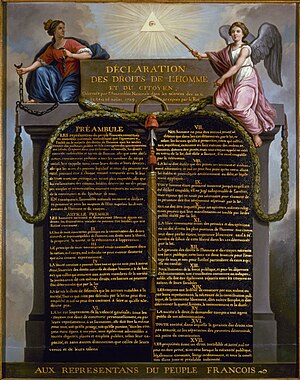
Constitutional and administrative law govern the affairs of the state. Constitutional law concerns both the relationships between the executive, legislature and judiciary and the human rights or civil liberties of individuals against the state. Most jurisdictions, like the United States and France, have a single codified constitution, with a Bill of Rights. A few, like the United Kingdom, have no such document; in those jurisdictions the constitution is composed of statute, case law and convention. A case named Entick v. Carrington[12] illustrates a constitutional principle deriving from the common law. Mr Entick's house was searched and ransacked by Sherrif Carrington. When Mr Entick complained in court, Sherrif Carrington argued that a warrant from a Government minister, the Earl of Halifax was valid authority. However, there was no written statutory provision or court authority. The leading judge, Lord Camden stated that,
"The great end, for which men entered into society, was to secure their property. That right is preserved sacred and incommunicable in all instances, where it has not been taken away or abridged by some public law for the good of the whole... If no excuse can be found or produced, the silence of the books is an authority against the defendant, and the plaintiff must have judgment."
The fundamental constitutional principle, inspired by John Locke,[13] is that the individual can do anything but that which is forbidden by law, while the state may do nothing but that which is authorised by law. Administrative law is the chief method for people to hold state bodies to account. People can apply for judicial review of actions or decisions by local councils, public services or government ministries, to ensure that they comply with the law. The first specialist administrative court was the Conseil d'Etat set up in 1799, as Napoleon assumed power in France.[14]
Criminal law
Criminal law is the body of law that defines criminal offences and the penalties for convicted offenders.[15] Apprehending, charging, and trying suspected offenders is regulated by the law of criminal procedure.[16] In every jurisdiction, a crime is committed where two elements are fulfilled. First, the criminal must have the requisite malicious intent to do a criminal act, or mens rea (guilty mind). Second, he must commit the criminal act, or actus reus (guilty act). Examples of different kinds of crime might include murder, assault, fraud or theft. In exceptional circumstances, defences can exist to some crimes, such as killing in self defence, or pleading insanity. A famous case in 19th century England, R v. Dudley and Stephens [17] involved the defence of "necessity". The Mignotte, sailing from Southampton to Sydney, sank. Three crew members, and a cabin boy, were stranded on a raft. They were starving, the cabin boy close to death. So the crew killed and ate the cabin boy. The crew survived and were rescued, but put on trial for murder. They argued it was necessary to kill the cabin boy to preserve their own lives. Lord Coleridge, expressing immense disapproval, ruled, "to preserve one's life is generally speaking a duty, but it may be the plainest and the highest duty to sacrifice it." They were sentenced to hang. Yet public opinion, especially among seafarers was outraged and overwhelmingly supportive. In the end, the Crown commuted their sentences to six months.
The offenses that involve criminal law are those construed as being against the state.[15] In common law countries the government takes the lead in prosecution and cases are cited as "The People v. ..." or "R. v. ..." Also, in many countries, lay juries determine the guilt of defendants on points of fact, although they may not change legal rules themselves. Some developed countries still have capital punishment and torture for criminal activity, but the normal punishment for a crime will be imprisonment, fines, or community service. Modern criminal law has been affected considerably by the social sciences, especially with respect to sentencing, legal research, legislation, and rehabilitation.[15] On the international field 104 countries have signed up to the International Criminal Court, which was set up to try people for crimes against humanity.[18]
Contract

Contract is based on the Latin phrase pacta sunt servanda (promises must be kept).[19] Contracts can be simple everyday buying and selling or complex multi-party agreements. They can be made orally (e.g. buying a newspaper) or in writing (e.g signing a contract of employment). Sometimes formalities, such as writing the contract down or having it witnessed, are required for the contract to take effect (e.g. when buying a house).[20]
In common law jurisdictions there are three key elements to the creation of a contract. These are offer and acceptance, consideration and an intention to create legal relations. For example, in Carlill v. Carbolic Smoke Ball Company a medical firm advertised that its new wonder drug, the smokeball, would cure people's flu, and if it did not, buyers would get £100.[21] Many people sued for their £100 when the drug did not work. Fearing bankruptcy, Carbolic argued the advert was not to be taken as a serious, legally binding offer. It was merely an invitation to treat, or mere puff, a gimmick. But the court of appeal held that to a reasonable man Carbolic had made a serious offer. People had given good "consideration" for it by going to the "distinct inconvenience" of using a faulty product. "Read the advertisement how you will, and twist it about as you will," said Lord Justice Lindley, "here is a distinct promise expressed in language which is perfectly unmistakable".[21]
"Consideration" means all parties to a contract must exchange something of value to be able to enforce it. Some common law systems, like Australia, are moving away from consideration as a requirement for a contract. The concept of estoppel or culpa in contrahendo can be used to create obligations during pre-contractual negotiations.[22] In civil law jurisdictions, consideration is not a requirement for a contract at all.[23] In France, an ordinary contract is said to form simply on the basis of a "meeting of the minds" or a "concurrence of wills". Germany has a special approach to contracts, which ties into property law. Their 'abstraction principle' (Abstraktionsprinzip) means that the personal obligation of contract forms separately from the title of property being conferred. When contracts are invalidated for some reason (e.g. a car buyer is so drunk that he lacks legal capacity to contract)[24] the contractual obligation to pay can be invalidated separately from the proprietary title of the car. Unjust enrichment law, rather than contract law, is then used to restore title to the rightful owner.[25]
Tort
Torts, sometimes called delicts, are civil wrongs. To have acted tortiously, one must have breached a duty to another person, or infringed some pre-existing legal right. A simple example might be accidentally hitting someone with a cricket ball.[26] Under negligence law, the most common form of tort, the injured party can make a claim against the party responsible for the injury. The principles of negligence are illustrated by Donoghue v. Stevenson.[27] Mrs Donoghue ordered an opaque bottle of ginger beer in a cafe in Paisley. Having consumed half of it, she poured the remainder into a tumbler. The decomposing remains of a dead snail floated out. She fell ill and sued the manufacturer for carelessly allowing the drink to be contaminated. The House of Lords decided that the manufacturer was liable for Mrs Donoghue's illness. Lord Atkin took a distinctly moral approach, and said,
"The liability for negligence... is no doubt based upon a general public sentiment of moral wrongdoing for which the offender must pay... The rule that you are to love your neighbour becomes in law, you must not injure your neighbour; and the lawyer’s question, Who is my neighbour? receives a restricted reply. You must take reasonable care to avoid acts or omissions which you can reasonably foresee would be likely to injure your neighbour."[28]
This became the basis for the four principles of negligence; (1) Mr Stevenson owed Mrs Donoghue a duty of care to provide safe drinks (2) he breached his duty of care (3) the harm would not have occurred but for his breach and (4) his act was the proximate cause, or not too remote a consequence, of her harm.[27] Another example of tort might be a neighbour making excessively loud noises with machinery on his property.[29] Under a nuisance claim the noise could be stopped. Torts can also involve intentional acts, such as assault, battery or trespass. A better known tort is defamation, which occurs, for example, when a newspaper makes unsupportable allegations that damage a politician's reputation.[30] More infamous are economic torts, which form the basis of labour law in some countries by making trade unions liable for strikes,[31] when statute does not provide immunity.[32]
Property law
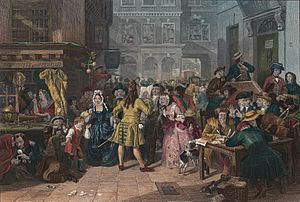
Property law governs everything that people call 'theirs'. Real property, sometimes called 'real estate' or a right in rem, refers to ownership of land and things attached to it.[33] Personal property, or a right in personam, refers to everything else; movable objects, such as computers or sandwiches or intangible rights, like stocks and shares or the copyright on a song. The classic civil law approach to property, propounded by Friedrich Carl von Savigny is that it is a right good against the world. This contrasts to an obligation, like a contract or tort, which is a right good between individuals.[34] Preferred in common law jurisdictions is an idea closer to an obligation; that the person who can show the best claim to a piece of property, against any contesting party, is the owner.[35] The idea of property raises important philosophical and political issues. John Locke famously argued that our "lives, liberties and estates" are our property because we own our bodies and mix our labour with our surroundings.[36] The idea of property is still contentious. French philosopher Pierre Proudhon most famously proclaimed, "property is theft".[37]
Land law forms the basis for most kinds of property law, and is the most complex. It concerns mortgages, rental agreements, licences, convenants, easements and the statutory systems for registration of land. Regulations on the use of personal property fall under intellectual property, company law, trusts and commercial law.
Trusts and equity
Equity is a body of rules from England that used to be separate from the "common law". Whilst "law" was administered by judges, the Lord Chancellor was the King's keeper of conscience.[38] He had authority to overrule the judges' law if they were too strict. Equity operates by principles rather than rigid rules. Whereas civil law systems, and the common law, do not allow two people to split ownership of one piece of property, equity allows this through the trust instrument. 'Trustees' control property, whereas the 'beneficial' (or 'equitable') ownership of trust property is held by people known as 'beneficiaries'. Trustees owe duties to their beneficiaries to take good care of the trust.[39] For example, in the early case of Keech v. Sandford[40] a child had inherited the lease on a market in Romford, London. Mr Sandford was entrusted to look after this property for the benefit of the child, until he was an adult. But the lease on the market was about to expire, and the landlord had (apparently) told Mr Sandford that he would not renew it for the child. But the landlord was happy, instead, to give the opportunity to Mr Sandford. Later on, the grown up child, Mr Keech sued his old trustee for the profit that he had made by getting the market's lease, because it represented a conflict of interest. The Lord Chancellor, Lord King, agreed and ordered Mr Sandford should disgorge his profits. He wrote,
"I very well see, if a trustee, on the refusal to renew, might have a lease to himself few trust-estates would be renewed... This may seem very hard, that the trustee is the only person of all mankind who might not have the lease; but it is very proper that the rule should be strictly pursued and not at all relaxed."[41]
Of course, Lord King LC was worried that trustees might exploit money they were meant to look after for their own benefit instead of doing their job. Just recently there had been a stock market crash, involving abuse of trusts. Strict duties like this made their way into company law and were applied to directors and chief executive officers. Another example of a duty might be for the trustee to invest the property wisely or sell it.[42] This is especially the case for pension funds, the most widely used type of trust, where banks are trustees for people's savings until their retirement. But trusts can also be set up for charitable purposes, famous examples being the British Museum or the Rockefeller Foundation.
Further disciplines
Law spreads far beyond the core subjects, into practically every area of life. Three categories are presented for convenience, though the subjects intertwine and flow into one another.
- Law and Society

- Labour law is the study of a tripartite industrial relationship, between worker, employer and trade union. This involves collective bargaining regulation, and the right to strike. Individual employment law refers to workplace rights, such as health and safety or a minimum wage.
- Human rights and human rights law are important fields to guarantee everyone basic freedoms and entitlements. These are laid down in codes such as the Universal Declaration of Human Rights, the European convention on human rights and the U.S. Bill of Rights.
- Civil procedure and criminal procedure concern the rules that courts must follow as a trial and appeals proceed. Both concern everybody's right to a fair trial or hearing.
- Evidence law involves which materials are admissible in courts for a case to be built.
- Immigration law and nationality law concern the rights of foreigners to live and work in a nation state that is not their own and to acquire or lose citizenship. Both also involve the rights of asylum and the problem of stateless individuals.
- Social security law refers to the rights people have to social insurance, such as jobseekers allowances or housing benefits.
- Family law covers marriage and divorce proceedings, the rights of children and of course the rights to property and money in the event of separation.
- Law and Commerce

- Commercial law covers complex contract and property law. The law of agency, insurance law, bills of exchange, insolvency and bankruptcy law and sales law are all important, and trace back to the mediaeval lex mercatoria. The UK Sale of Goods Acts and the Uniform Commercial Code are examples of codified common law commercial principles.
- Company law sprung from the law of trusts, on the principle of separating ownership and control.[43] The law of the modern company began with the Joint Stock Companies Act, passed in the United Kingdom in 1865, which protected investors with limited liability and conferred separate legal personality.
- Intellectual property deals with patents, trademarks and copyrights. These are intangible assets, like the right not to have your idea for an invention stolen, a brand name or a song you have written.
- Restitution deals with the recovery of someone else's gain, rather than compensation for one's own loss.
- Unjust enrichment is law covering a right to retrieve property from someone that has profited unjustly at another's expense.
- Law and Regulation

- Tax law is probably the most complicated and well paid discipline, involving Value Added Tax, Corporation Tax, Income Tax, and most importantly, lots of money.
- Banking law and financial regulation set minimum standards on the amounts of capital banks must hold, and rules about best practice for investment. This is to insure against the risk of economic crises, such as the Wall Street Crash.
- Regulated industries are attached to an important body of law, for instance water law, for the provision of public services. Especially since privatisation became popular, private companies doing the jobs previously controlled by government have been bound by social responsibilities. Energy, gas telecomms and water are regulated industries in most OECD countries.
- Competition law, in the U.S. known as antitrust law, is an evolving and relatively new kind of law that began in the late 19th Century with the restraint of trade doctrine. The U.S. adopted anti-cartel and anti-monopoly statutes around the turn of that century. See the Sherman Act and Clayton Act.
- Consumer Law could include anything from regulations on unfair contract terms and conditions, or directives on airline baggage insurance.
- Environmental law is increasingly important, especially in light of the Kyoto Protocol and the imminent danger of climate change. Environmental protection also serves to penalise polluters within countries.
Legal systems
In general, legal systems around the world can be split between civil law jurisdictions on the one hand and on the other systems using common law and equity. The term civil law, referring to a legal system, should not be confused with civil law as a group of legal subjects, as distinguished from criminal law or public law. A third type of legal system, still accepted by some countries in part, or even in whole, is religious law, based on scriptures and interpretations thereof. The specific system that a country follows is often determined by its histories, and countries that have been historically linked often follow similar systems. The classification of different systems is a matter of form rather than substance, since similar rules often prevail. The sources that jurisdictions recognise as authoritatively binding are the defining features of legal systems.
Civil law
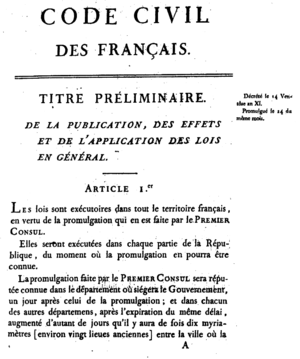
Civil law is the legal system used in most countries around the world today. In civil law, the sources recognised as authoritative are codifications, in constitutions or statutes passed by government. Codifications date back millenia, with one early example being the ancient Babylonian Codex Hammurabi, but modern civil law systems essentially derive from the legal practice of the Roman Empire, whose texts were rediscovered in medieval Europe. Roman law, in the days of the Roman republic and Empire, was heavily procedural and there was no professional legal class.[44] Instead a lay person, iudex, was chosen to adjudicate. Precedents were not reported, so any case law that developed was disguised and almost unrecognised.[45] Each case was to be decided afresh from the laws of the state, which mirrors the (theoretical) unimportance of judges' decisions for future cases in civil law systems today. During the 6th century AD, in the Eastern Roman Empire, the Emperor Justinian codified and consolidated the laws that had existed in Rome so that what remained was one twentieth of the mass of legal texts from before.[46] This became known as the Corpus Juris Civilis. As one legal historian wrote, "Justinian consciously looked back to the golden age of Roman law and aimed to restore it to the peak it had reached three centuries before"[47] Western Europe, meanwhile, slowly slipped into the dark ages, and it was not until the eleventh century AD that in scholars in the University of Bologna rediscovered the texts and used them to interpret their own laws.[48] Civil law codifications based closely on Roman law continued to spread throughout Europe until the Enlightenment; then, in the nineteenth century, both France, with the Code Civil and Germany, with the Bürgerliches Gesetzbuch modernised their legal codes. Both these codes influenced heavily not only the law systems of the countries in continental Europen (e.g. Greece), but also the Japanese, and Korean legal traditions.[49] Today countries that have civil law systems range from Russia, and China to most of central and Latin America.[50]
Common law and equity
Common law and equity are systems of law whose special distinction is the doctrine of precedent, or stare decisis (Latin for "to stand by decisions"). Alongside this "judge made law", common law systems always have governments who pass new laws and statutes. But these are not put into a codified form. Common law comes from England and was inherited by almost every country that once belonged to the British Empire, with the exceptions being Malta, Scotland and the US state of Louisiana.
Common law had its beginnings in the middle ages, when the English monarchy had been weakened by the enormous cost of fighting the crusades. King John had been forced by his barons to sign a document limiting his authority to pass laws. This "great charter" or Magna Carta of 1215 also required that the King's entourage of judges hold their courts and judgments at "a certain place" rather than dispensing autocratic justice in unpredictable places about the country.[51] A concentrated and elite group of judges acquired a dominant role in law making under this system, and compared to its European counterparts the English judiciary became highly centralised. In 1297, for instance, while the highest court in France had fifty one judges, the English Court of Common Pleas had five.[52] This powerful and tight-kinit judiciary gave rise to a rigid and inflexible system of common law.[53] As a result, as time went on increasing numbers of citizens petitioned the King to override the common law, and on the King's behalf the Lord Chancellor gave judgment to do what was equitable in a case. From the time of Sir Thomas More, the first lawyer to be appointed as Lord Chancellor, a systematic body of equity grew up alongside the rigid common law, and developed its own Court of Chancery. At first, equity was often criticised as erratic, that it "varies like the Chancellor's foot". But over time it developed solid principles, especially under Lord Eldon.[54] In the nineteenth century the two systems were fused into one another. Academic authors have always played an important part in developing the common law. William Blackstone was the first scholar to describe and teach it.[55] In fact, people who sought explanations and underlying structures changed the way the law worked merely by describing it.[56]
Religious law
Religious law refers to the notion that the word of God is a law. Examples include the Jewish Halakha and Islamic Sharia, both of which mean the "path to follow". Christian Canon law also survives in some Church communities. The implication of religion for law is unalterability, because the word of God cannot be ammended or legislated against by judges or governments. However, religious texts never include the scale of law needed in a developed community. For instance, the Koran has some law, but not much and it acts merely as a source of further law, through interpretation.[57] This is mainly contained in a body of jurisprudence known as the fiqh. In some cases religious law is intended purely as individual moral guidance. The first five books of the Old Testament are known as the Torah and include Genesis, Exodus, Leviticus, Numbers and Deuteronomy. The Halakha is the interpretation of teachings and is followed by orthodox and conservative Jews in both ecclesiastical and civil relations. No country is fully governed by Halakha, but two Israeli people may decide, because of personal belief, to have a dispute heard by a Jewish court, and be bound by its rulings. Sharia law similarly is merely an optional supplement to the civil or common law of most countries, though Saudi Arabia and Iran's whole legal systems source their law in Sharia. Canon law is only in use by members of the clergy the Roman Catholic Church, the Eastern Orthodox Church and the Anglican Communion.
Jurisdictions
Despite the usefulness of different classifications, every legal system has its own individual identity. Below are groups of legal systems, categorised by their geography. Click the "show" buttons on the right for the lists of countries.
Template:Africa in topic Template:North America in topic Template:South America in topic Template:Asia in topic Template:Europe in topic Template:Oceania in topic
Legal theory
History of law
The history of law is closely connected to the development of civilizations. Ancient Egyptian law, dating as far back as 3000BC, had a civil code that was probably broken into twelve books. It was based on the concept of Ma'at, characterised by tradition, rhetorical speech, social equality and impartiality.[58] Around 1760 BC under King Hammurabi, ancient Babylonian law was codified and put in stone for the public to see in the marketplace. This became known as the Codex Hammurabi, which was found in a stone engraving. But like Egyptian law, which is pieced together by historians from records of litigation, few sources remain. The influence of these earlier laws on later civilizations was small.[59] The Torah from the Old Testament is probably the oldest body of law still relevant for modern legal systems, dating back to 1280BC. It takes the form of moral imperatives, like the Ten Commandments and the Noahide Laws, as recommendations for a good society. Ancient Athens, the small Greek city-state, was the first society based on broad inclusion of the citizenry, excluding women and the slave class. Athens had no legal science, and Ancient Greek has no word for "law" as an abstract concept.[60] Yet Ancient Greek law contained major constitutional innovations in the development of democracy.[61]
Roman law was heavily influenced by Greek teachings.[62] It forms the bridge to the modern legal world, over the centuries between the rise and decline of the Roman Empire.[63] Roman law underwent major codification in the Corpus Juris Civilis of Emperor Justinian. Roman law was lost through the Dark Ages, but rediscovered around the eleventh century. Mediæval legal scholars began researching the Roman codes and using their concepts. In Mediæval England, the King's powerful judges began to develop a body of precedent, which became the common law. But also, a Europe wide lex mercatoria was formed, so that merchants could trade using familiar standards, rather than the many splintered types of local law. A precursor to modern commercial law, the lex mercatoria emphasised the freedom of contract and alienability of property.[64] As nationalism grew in the 18th and 19th centuries, lex mercatoria was incorporated into countries' local law under new civil codes. The French Napoleonic Code and the German became the most influential. As opposed to the common law used in England, or the U.S.A. consisting of massive tomes of case law, codes in small books are easy to export. However, today there are signs that civil and common law are converging. European Union law is codified in treaties, but develops through the precedent laid down by the European Court of Justice.
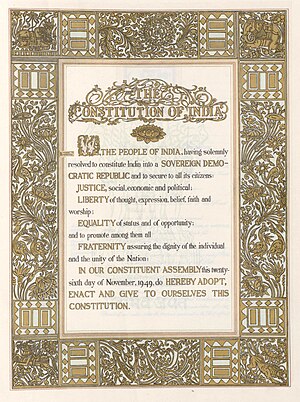
Ancient India and China represent distinct traditions of law, and had historically independent schools of legal theory and practice. The Arthashastra, dating from the 400BC, and the Manusmriti from 100AD were influential treatises in India, texts that were considered authoritative legal guidance.[65] Manu's central philosophy was tolerance and pluralism, and was cited across South East Asia.[66] But this Hindu tradition, along with Islamic law, was supplanted by the common law when India became part of the British Empire.[67] Malaysia, Brunei, Singapore and Hong Kong also adopted the common law. The legal tradition of the Eastern Asia reflects a unique blend of secular and religious influences.[68] Japan was the first country to begin modernising its legal system on western lines, by importing the French, but mostly the German Civil Codes.[69] This partly reflected Germany's status as a rising power in the late nineteenth century and traditional Chinese law gave way towards the final years of the Ch'ing dynasty to westernisation in the form of six private law codes based mainly on the Japanese model of German law.[70] Today Taiwanese law retains the closest affinity to the codifications from that period, because of the split between Chang Kai Shek's nationalists, who fled there, and Mao Tse Tung's communists who won control of the mainland in 1949. The current legal infrastructure in the People's Republic of China was heavily influenced by soviet Socialist law, which essentially inflates administrative law at the expense of private law rights.[71] Today, however, because of rapid industrialisation, China has been reforming, and a new contract code in 1999 represented a turn away from administrative domination.[72] Furthermore, after negotiations lasting fifteen years, in 2001 China joined the World Trade Organisation.[73]
Philosophy of law
- See also: Political philosophy
| "But what, after all, is a law? [...] When I say that the object of laws is always general, I mean that law considers subjects en masse and actions in the abstract, and never a particular person or action. [...] On this view, we at once see that it can no longer be asked whose business it is to make laws, since they are acts of the general will; nor whether the prince is above the law, since he is a member of the State; nor whether the law can be unjust, since no one is unjust to himself; nor how we can be both free and subject to the laws, since they are but registers of our wills." |
| Jean-Jacques Rousseau, The Social Contract, II, 6.[74] |
The philosophy of law is known as jurisprudence. Normative jurisprudence is essentially political philosophy and asks "what should law be?". Analytic jurisprudence asks on the other hand, "what is law?". An early famous philosopher of law was John Austin, a student of Jeremy Bentham and first chair of law at the new University of London from 1829. Austin's utilitarian answer was that law is "commands, backed by threat of sanctions, from a sovereign, to whom people have a habit of obedience".[6] This approach was long accepted, especially as an alternative to natural law theory. Natural lawyers, such as Jean-Jacques Rousseau, argue human law reflects essentially moral and unchangeable laws of nature. Immanuel Kant, for instance, believed a moral imperative requires laws "be chosen as though they should hold as universal laws of nature".[75] Austin and Bentham, following David Hume thought this conflated what "is" and what "ought to be" the case. They believed in law's positivism, that real law is entirely separate from "morality".[76]
In 1934, the Austrian philosopher Hans Kelsen continued the positivist tradition in his book the Pure Theory of Law.[77] Kelsen believed that though law is separate from morality, it is endowed with "normativity", meaning we ought to obey it. Whilst laws are positive "is" statements (e.g. the fine for reversing on a highway is $500), law tells us what we "should" do (i.e. not drive backwards). So every legal system can be hypothesised to have a basic norm (Grundnorm) telling us we should obey the law.
Later in the twentieth century H.L.A. Hart attacked Austin for his simplifications and Kelsen for his fictions in The Concept of Law.[78] As the chair of jurisprudence at Oxford University, Hart argued law is a "system of rules". Rules, said Hart, are divided into primary rules (rules of conduct) and secondary rules (rules addressed to officials to administer primary rules). Secondary rules are divided into rules of adjudication (to resolve legal disputes), rules of change (allowing laws to be varied) and the rule of recognition (allowing laws to be identified as valid). Two of Hart's students have continued the debate since. Ronald Dworkin was his successor in the Chair of Jurisprudence at Oxford and his greatest critic. In his book Law's Empire Dworkin attacked Hart and the positivists for their refusal to treat law as a moral issue. Dworkin argues that law is an "interpretive concept", that requires judges to find the best fitting and most just solution to a legal dispute, given their constitutional traditions. Joseph Raz on the other hand has defended the positivist outlook and even criticised Hart's 'soft social thesis' approach in The Authority of Law.[5] Raz argues that law is authority, identifiable purely through social sources, without reference to moral reasoning. Any categorisation of rules beyond their role as authoritative dispute mediation is best left to sociology, rather than jurisprudence.[79]
Economic analysis of law
Economic analysis of law is an approach to legal theory that incorporates and applies the methods and ideas of economics to law. The discipline arose partly out of a critique of trade unions and U.S. Antitrust law. The most influential proponents, such as Richard Posner and Oliver Williamson and the so called Chicago School of economists and lawyers, such as Milton Friedman and Gary Becker, are generally advocates of deregulation and privatization, and are hostile to state regulation, or what they see as restrictions on the operation of free markets.[81]
The most decorated economic analyst of law is 1991 Nobel Prize winner Ronald Coase. His first major article, The Nature of the Firm (1937), argued that the reason for the existence of firms (companies, partnerships, etc) is the existence of transaction costs.[82] Rational individuals trade through bilateral contracts on open markets until the costs of transactions mean that using corporations to produce things is more cost effective. His second major article, The Problem of Social Cost (1960) argued that if we lived in a world without transaction costs, people would bargain with one another to create the same allocation of resources, regardless of the way a court might rule in property disputes.[83] Coase used the example of a nuisance case named Sturges v. Bridgman, where a noisy sweetmaker and a quiet doctor were neighbours and went to court to see who should have to move.[84] Coase said that regardless of whether the judge ruled that the sweetmaker had to stop using his machinery, or that the doctor had to put up with it, they could strike a mutually beneficial bargain about who moves house that reaches the same outcome of resource distribution. Only, the existence of transaction costs may prevent this.[85] So the law ought to pre-empt what would happen, and be guided by the most efficient solution. The idea is that law, and regulation, is not as important or effective at helping people as lawyers, and government planners, believe.[86] Coase and others like him wanted a change of approach, to put the burden of proof for positive effects on a government that was intervening in the market, by analysing the costs of action.[87]
Sociology of law
Sociology of law is a diverse field of study which includes social scientific investigations of the institutions of law, the professionalisation of law and lawyers, the social construction of legal issues and systems, and the interaction of legal institutions, doctrines, and practices with other aspects of society. The field was initially received with suspicion by legal theorists, such as Kelsen, who attacked one of its founders, Eugen Ehrlich.[88] Weber, who was also critical towards Ehrlich, defined the scope of a new social scientific approach to law, while his theories influenced Karl Horvath, Hugo Sinzheimer, and Theodor Geiger. Other important early contributors to the sociology of law were Emile Durkheim, Georges Gurvitch and Leon Petrażycki in Europe, and Roscoe Pound and William Graham in the U.S.[89]
Legal institutions
| "It is a real unity of them all in one and the same person, made by covenant of every man with every man, in such manner as if every man should say to every man: I authorise and give up my right of governing myself to this man, or to this assembly of men, on this condition; that thou give up, thy right to him, and authorise all his actions in like manner. |
| Thomas Hobbes, Leviathan, XVII |
The main institutions of law in industrialised countries are independent courts, representative parliaments, an accountable executive, the military and police, bureaucratic organisation, the profession of lawyers and civil society itself. John Locke in Two Treatises On Civil Government and Baron de Montesquieu after him in The Spirit of the Laws advocated a separation of powers between the institutions that wield political influence, namely the judiciary, legislature and executive.[90] Their principle was that no person should be able, as Thomas Hobbes wanted an all powerful sovereign to be, to usurp a Leviathan of power.[91] More recently Max Weber and many others reshaped thinking about the extensions of the state that come under the control of the executive. Modern military, policing and bureaucratic power over ordinary citizens' daily lives pose special problems for accountability that earlier writers like Locke and Montesquieu could not have foreseen. The custom and practice of the legal profession itself is an important part of people's access to justice, whilst civil society is a term used to refer to the social institutions, communities and partnerships that are the political base of the law.
Judiciary
A judiciary is a group of judges who mediate and determine the outcome of peoples' disputes. Most countries have a system of appeals courts, up to a supreme authority. In the U.S. this is the Supreme Court[92] or in Australia, the High Court. In the U.K. the highest court is the House of Lords,[93] In Germany there is a Supreme Federal Constitutional Court, while the main court of last resort in France is the Cour de Cassation.[94] However, for most European countries the European Court of Justice[95] in Luxembourg may overrule national law, where EU law is relevant. Also the European Court of Human Rights in Strasbourg allows any European citizen to appeal cases to it, where human rights issues arise.
Almost every country in the world allows its highest judicial authority to strike down legislation that is determined to be unconstitutional. For instance, the United States Supreme Court struck down a Texan law forbidding women to be assisted with abortion in Roe v. Wade.[96] The constitution's fourteenth amendment is interpreted to give Americans a right to privacy, and a woman's right to choose to have an abortion is part of that. The judiciary is theoretically bound by a constitution, as much legislatures are. In most countries judges may only interpret the constitution, and all other laws. However in common law countries, where matters are not constitutional, the judiaciary may also create law under the doctrine of precedent. On the other hand, the United Kingdom, Finland and New Zealand still assert the ideal of parliamentary sovereignty, whereby the unelected judiciary may not overturn law passed by a democratic legislature.
Legislature
The Houses of Parliament in London, the Congress in Washington D.C., the Bundestag in Berlin, the Duma in Moscow and the Assemblée nationale in Paris are all examples of legislatures. The principle of representative government means that people vote for political decision makers to carry out their wishes. Although some countries, including Israel, Greece, Sweden and China, are unicameral, having only one legislative chamber, most legislatures are bi-cameral, consisting of two chambers or houses. In a 'lower house' politicians are elected to represent smaller constituencies. The 'upper house' is usually elected to represent a larger state in a federal system (as in Australia or Germany), or a different voting configuration (as in France) or in a unitary system the upper house is appointed to be advisors of the Crown (as in the UK). One criticism of bicameral systems with two elected chambers is that the upper and lower houses may simply mirror one another. On the other hand, the traditional justification of bicameralism is that it minimises arbitrariness and injustice in governmental action.[97]
To pass legislation a majority of Members of Parliament must vote for a bill in each house. Normally there will be several readings and amendments proposed by the different political factions. If a country has an entrenched constitution a special majority for changes to the constitution will be required, making changes to the law more difficult. A government usually leads the process, which can be formed from Members of Parliament (e.g. the U.K. or Germany). But in a presidential system, an executive appoints a cabinet to govern from his or her political allies whether or not they are elected (e.g. the U.S. or Brazil) and the legislature's role is reduced to either ratification or veto.
Executive
The "executive" in a legal system refers to the governing centre of political authority. In most democratic countries, like the UK, Germany, India and Japan, the executive is elected into and drawn from the legislature and is known as a cabinet. Alongside there is usually a head of state without formal political power, who symbolically enacts laws. This figure can be appointed (such as the Bundespräsident in Germany), hereditary (like the Queen of the United Kingdom) or elected by poplular vote (as is the President of Austria). The other important model is found in countries like France, the U.S. and Russia. Under such presidential systems the executive branch exists and presides separately from the legislature, to which it is not accountable, and which cannot in normal circumstances dismiss it.[98]
The executive's role may vary from country to country. Usually, it will initiate or propose the majority of legislation and deal with a country's foreign relations. The military and police often fall under executive control, as does the bureaucracy. Ministers, or secretaries of state of the government head a country's public offices, such as the health department, or the department of justice. The election of a different executive is therefore capable of revolutionising an entire country's approach to government.
Military and police

The military and police are sometimes referred to as "the long and strong arm of the law".[99] Whilst military organisation has existed as long as have governments, a standing police force is a relatively modern invention. Mediaeval England, for instance, used a system of travelling criminal courts, or assizes to keep communities under control. The first modern police were probably those in 17th century Paris, in the court of Louis XIV,[100] although the Paris Prefecture of Police's website claims were the first uniformed policemen in the world.[101] In 1829, after the French Revolution and Napoleon's dictatorship, a government decree created the first uniformed policemen in Paris and all French cities, known as sergents de ville ("city sergeants"). In Britain, the Metropolitan Police Act 1829 was passed by Parliament under home secretary Sir Robert Peel, founding the London Metropolitan Police.
Sociologist Max Weber famously argued that the state is that which controls the legitimate monopoly of the means of violence.[102] Military and police personnel carry out enforcement activities at the request of the government or the courts. The term failed state is used where the police and military no longer uphold security and order and society descends into civil war, anarchy or chaos.
Bureaucracy
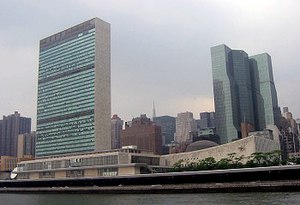
The word "bureaucracy" derives from the French for "office" (bureau) and Ancient Greek for "power" (kratos). It refers to all government servants and bodies who carry out the wishes of the executive. Baron de Grimm, a German author who lived in France, wrote in 1765,
"The real spirit of the laws in France is that bureaucracy of which the late Monsieur de Gournay used to complain so greatly; here the offices, clerks, secretaries, inspectors and intendants are not appointed to benefit the public interest, indeed the public interest appears to have been established so that offices might exist."[103]
Cynicism over "officialdom" is still common, and the workings of public servants is often contrasted to private enterprise driven by the profit motive.[104] Writing in the early 20th century, Max Weber believed that a definitive feature of a developed state had come to be its bureaucratic support.[105] Weber wrote that the typical characteristics of modern bureaucracy are that officials define its mission, the scope of work is bound by rules, management is composed of career experts, top down, they communicate through writing and bind public servants discretion with rules.[106] Although private companies typically have bureaucracies as well, public bureaucratic action is the locus of government power.[107] Bureaucracy can play a negative role with ever more "red tape", or a positive one, by organising public services such as schooling, health care, policing or public transport.
Legal profession
Lawyers give people advice about their legal rights and duties and represent them in court, for the law to be adequately accessible to everyone, and for people to be able to foresee what law means for them.[108] Practice of law is typically overseen by either a government organization or independent regulating body such as a bar association, bar council, barrister society, or law society. An aspiring practitioner of law must be certified by the regulating body before beginning to practice. This usually entails a two or three-year program at a university faculty of law or a law school, which earns the student a Bachelor of Laws, a Bachelor of Civil Law or a Juris Doctor degree. This course of study is followed by an entrance examination (e.g. bar admission). Some countries require a further vocational qualification before a person is permitted to practice law. In the case of those wishing to become a barrister, this would lead to a Barrister-at-law degree, followed by a year's apprenticeship (sometimes known as pupillage or devilling) under the oversight of an experienced barrister (or master). Advanced law degrees are also often pursued, though they are academic degrees and are not required for the practice of law. These include a Master of Laws, a Master of Legal Studies, and a Doctor of Laws.
Once accredited, a lawyer will often work in a law firm, in a chambers, as a sole practitioner, for a government or as internal counsel at a private corporation. Another option is to become a legal researcher who provides on-demand legal research through a commercial service or on a freelance basis. Many people trained in law put their skills to use outside the legal field entirely. A significant component to the practice of law in the common law tradition involves legal research in order to determine the current state of the law. This usually entails exploring case-law reports, legal periodicals and legislation. Law practice also involves drafting documents such as court pleadings, persuasive briefs, contracts, or wills and trusts. Negotiation and dispute resolution skills are also important parts of legal practice, depending on the field.
Civil society
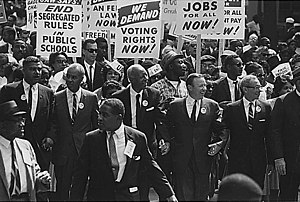
The term "civil society" traces back to John Locke who saw civil society as being people who have "a common established law and judicature to appeal to, with authority to decide controversies between them."[109] German philosopher Georg Wilhelm Friedrich Hegel also distinguished the "state" from "civil society" (Zivilgesellschaft) in Elements of the Philosophy of Right.[110] Hegel believed civil society and the state were polar opposites, within the scheme of his dialectic theory of history.[111] Civil society is necessarily a source of law, by being the basis for people to form opinions and lobby for what they believe law should be. As Australian barrister and author Geoffrey Robertson wrote of international law,
"one of its primary modern sources is found in the responses of ordinary men and women, and of the non-governmental organizations which many of them support, to the human rights abuses they see on the television screen in their living rooms."[112]
Freedom of speech, freedom of association and many other individual rights allow people to meet together, discuss, criticise and hold to account their governments, forming the basis of a deliberative democracy. The more people are involved with, concerned by and capable of changing how political power is exercised over their lives, the more acceptable and legitimate the law becomes to the people. Developed political parties, debating clubs, trade unions, impartial media, business and charities are all part of a healthy civil society.
See also
- Main lists: List of basic law topics and List of legal topics
- Glossary of legal terms
- Landmark decision
- List of areas of law
- Lists of case law
- List of jurists
- List of legal abbreviations
Notes
- ↑ Law, Online Etymology Dictionary
* Legal, Mirriam-Webster's Online Dictionary - ↑ This the definition H. L. A. Hart gave in his work The Concept of Law (Campbell, The Contribution of Legal Studies, 184).
- ↑ Law, Law.com Dictionary
- ↑ Dworkin, Law's Empire, 66
- ↑ 5.0 5.1 Raz, The Authority of Law, 3-36
- ↑ 6.0 6.1 Bix, John Austin
- ↑ The original French is: "la loi, dans un grand souci d'égalité, interdit aux riches comme aux pauvres de coucher sous les ponts, de mendier dans les rues et de voler du pain" (France, The Red Lilly, Chapter VII).
- ↑ "No one then denies, that it is necessary that there should be some person to decide those cases which cannot come under the cognisance of a written law: but we say, that it is better to have many than one" (Aristotle, Politics 3.16).
- ↑ The prevailing manner of enforcing international law is still essentially "self help"; that is the reaction by states to alleged breaches of international obligations by other states (Robertson, Crimes against Humanity, 90; Shermers-Blokker, International Institutional Law, 900-901)
- ↑ Shermers-Blokker, International Institutional Law, 943
- ↑ C-26/62 Van Gend en Loos v. Nederlanse Administratie Der Belastingen, Eur-Lex
- ↑ Entick v. Carrington (1765) 19 Howell's State Trials 1030
- ↑ Locke, The Second Treatise, Chapter 9, section 124
- ↑ Auby, Administrative Law in France, 75
- ↑ 15.0 15.1 15.2 "Criminal law". Encyclopaedia Britannica.
- ↑ "Procedural law". Encyclopaedia Britannica.
- ↑ Regina v. Dudley and Stephens ([1884] 14 QBD 273 DC)
- ↑ The States Parties to the Rome Statute, International Criminal Court
- ↑ Wenberg, Pacta Sund Servanda, 775
- ↑ e.g. In England, s.52 Law of Property Act 1925
- ↑ 21.0 21.1 Carlill v. Carbolic Smoke Ball Company [1893] 1 QB 256. See a full law report from Justis
- ↑ Austotel v. Franklins (1989) 16 NSWLR 582
- ↑ e.g. In Germany, § 311 Abs. II BGB
- ↑ § 105 Abs. II BGB
- ↑ Smith, The Structure of Unjust Enrichment Law, 1037
- ↑ Bolton v. Stone [1951] A.C. 850
- ↑ 27.0 27.1 Donoghue v. Stevenson ([1932] A.C. 532, 1932 S.C. (H.L.) 31, [1932] All ER Rep 1). See the original text of the case in UK Law Online
- ↑ Donoghue v. Stevenson [1932] A.C. 532, 580
- ↑ Sturges v. Bridgman (1879) 11 Ch D 852
- ↑ e.g. concerning a British politician and the Iraq war, Galloway v. Telegraph Group Ltd [2004] EWHC 2786
- ↑ Taff Vale Railway Co. v. Amalgamated Society of Railway Servants [1901] AC 426
- ↑ in the U.K., Trade Union and Labour Relations (Consolidation) Act 1992; c.f. in the U.S., National Labor Relations Act
- ↑ Hunter v. Canary Wharf Ltd. (1997) 2 AllER 426.
- ↑ Savigny. Das Recht des Besitzes, 25
- ↑ P. Matthews, The Man of Property, 251-274
- ↑ Locke, Second Treatise on Civil Government, Chapter 9, section 123
- ↑ Proudhon, What is Property?, Chapter I (Method Pursued in this Book - The Idea of a Revolution)
- ↑ McGhee, Snell's Equity, 7
- ↑ c.f. Bristol and West Building Society v. Mothew [1998] Ch 1
- ↑ Keech v. Sandford (1726) Sel Cas. Ch.61
- ↑ Keech v. Sandford (1726) Sel Cas. Ch.61
- ↑ Nestle v. National Westminster Bank plc [1993] 1 WLR 1260
- ↑ Berle, Modern Corporation and Private Property
- ↑ Gordley-von Mehren, Comparative Study of Private Law, 18
- ↑ Gordley-von Mehren, Comparative Study of Private Law, 21
- ↑ Stein, Roman Law in European History, 32
- ↑ Stein, Roman Law in European History, 35
- ↑ Stein, Roman Law in European History, 43
- ↑ Hatzis, The Short-Lived Influence of the Napoleonic Civil Code in Greece, 253-263
* Demirgüç-Kunt -Levine, Financial Structures and Economic Growth, 204 - ↑ The World Factbook - Field Listing - Legal system, CIA
- ↑ Magna Carta, Fordham University
- ↑ Gordley-von Mehren, Comparative Study of Private Law, 4
- ↑ Gordley-von Mehren, Comparative Study of Private Law, 3
- ↑ Gee v. Pritchard (1818) 2 Swans. 402, 414
- ↑ Blackstone, Commentaries on the Laws of England, Book the First - Chapter the First
- ↑ Gordley-von Mehren, Comparative Study of Private Law, 17
- ↑ Glenn, Legal Traditions of the World, 159
- ↑ Théodoridés "law". Encyclopedia of the Archaeology of Ancient Egypt.
* VerSteeg, Law in ancient Egypt - ↑ Glenn, Legal Traditions of the World, 86
- ↑ Kelly, A Short History of Western Legal Theory, 5-6
- ↑ Ober, The Nature of Athenian Democracy, 121
- ↑ Kelly, A Short History of Western Legal Theory, 39
- ↑ As a legal system, Roman law has affected the development of law in most of Western civilization as well as in parts of the Eastern world. It also forms the basis for the law codes of most countries of continental Europe ( "Roman law". Encyclopaedia Britannica. ).
- ↑ Sealey-Hooley, Commercial Law, 14
- ↑ Glenn, Legal Traditions of the World, 255
- ↑ Glenn, Legal Traditions of the World, 276
- ↑ Glenn, Legal Traditions of the World, 273
- ↑ Glenn, Legal Traditions of the World, 287
- ↑ Glenn, Legal Traditions of the World, 304
- ↑ Glenn, Legal Traditions of the World, 305
- ↑ Glenn, Legal Traditions of the World, 307
- ↑ Glenn, Legal Traditions of the World, 309
- ↑ Farah, Five Years of China WTO Membership, 263-304
- ↑ Rousseau, The Social Contract, Book II: Chapter 6 (Law)
- ↑ Kant, Immanuel, Groundwork of the Metaphysics of Morals, 42 (par. 434)
- ↑ Green, Legal Positivism
- ↑ Marmor, The Pure Theory of Law
- ↑ Bayles, Hart's Legal Philosophy, 21
- ↑ Raz, The Authority of Law, 37 etc.
- ↑ The Becker-Posner Blog. Retrieved on 2007-02-03.
- ↑ S.M. Jakoby, Economic Ideas and the Labour Market, 53
- ↑ Coase, The Nature of the Firm, 386-405
- ↑ Coase, The Problem of Social Coast, 1-44
- ↑ Sturges v. Bridgman (1879) 11 Ch D 852
- ↑ Coase, The Problem of Social Cost, IV, 7
- ↑ Coase, The Problem of Social Cost, V, 9
- ↑ Coase, The Problem of Social Cost, VIII, 23
- ↑ Rottleuthner, La Sociologie du Droit en Allemagne, 109
* Rottleuthner, Rechtstheoritische Probleme der Sociologie des Rechts, 521 - ↑ Gurvitch, Sociology of Law, 142
* Papachristou, Sociology of Law, 81-82 - ↑ Montesquieu, The Spirit of Laws, Book XI: Of the Laws Which Establish Political Liberty, with Regard to the Constitution, Chapters 6-7
- ↑ Thomas Hobbes, Leviathan, XVII
- ↑ A Brief Overview of the Supreme Court, Supreme Court of the United States
- ↑ House of Lords Judgments, House of Lords
- ↑ Entscheidungen des Bundesverfassungsgerichts, Bundesverfassungsgericht
* Jurisprudence, publications, documentation, Cour de cassation - ↑ European Court of Justice. Retrieved on 2006-11-10.
- ↑ Roe v. Wade (1973) 410 U.S. 113 Retrieved 2007-01-26
- ↑ Riker, The Justification of Bicameralism, 101
- ↑ Haggard, Presidents, Parliaments and Policy, 71
* Olson, The New Parliaments of Central and Eastern Europe, 7 - ↑ Dickens, The Old Curiosity Shop, Chapter 73
- ↑ History of Police Forces, History.com Encyclopedia
- ↑ Des Sergents de Ville et Gardiens de la Paix à la Police de Proximité, La Préfecture de Police
- ↑ Weber, Politics as a Vocation
* Weber, The Theory of Social and Economic Organization, 154 - ↑ Melchior, Friedrich and Diderot, Denis (1813 Ed.) Correspondence littéraire, philosophique et critique, 1753-69 Vol. 4, p. 146 & 508 - cited by Albrow, Martin (1970) Bureaucracy p. 16
- ↑ Mises, Bureaucracy, II, Bureaucratic Management
- ↑ Weber, Economy and Society, I, 393
- ↑ Kettl, Public Bureaucracies, 371
- ↑ Kettl, Public Bureaucracies, 367
- ↑ The Sunday Times v. The United Kingdom [1979] ECHR 1 at 49 Case no. 6538/74
- ↑ Locke, Second Treatise, Chapter 7, section 87
- ↑ Hegel, Elements of the Philosophy of Right, 3, II, 182
- ↑ Pelczynski, The State and Civil Society, 1-13
- ↑ Robertson, Crimes Against Humanity, 98-99
References
Printed sources
- Template:Cite wikisource. See original text in Perseus program.
- Auby, Jean-Bernard (2002). “Administrative Law in France”, Administrative Law of the European Union, its Member States and the United States edited by F. A. M. Stroink, René Seerden. Intersentia, 75. ISBN 9-050-95251-8.
- Bayles, Michael D. (1992). “A Critique of Austin”, Hart's Legal Philosophy. Springer. ISBN 0--792-31981-8.
- Berle, Adolf (1932). Modern Corporation and Private Property.
- Blackstone, William (1765-69). Commentaries on the Laws of England.
- Campbell, Tom D. (1993). “The Contribution of Legal Studies”, A Companion to Contemporary Political Philosophy edited by Robert E. Goodin and Philip Pettit. ISBN 0-631-19951-9.
- Coase, Ronald H. (November 1937). "The Nature of the Firm". Economica 4 (16): 386-405. Retrieved on 2007-02-10.
- Coase, Ronald H. (October 1960). The Problem of Social Cost "The Problem of Social Cost (this online version excludes some parts)". Journal of Law and Economics 3: 1-44. Retrieved on 2007-02-10.
- "Criminal law". Encyclopaedia Britannica. (2002).
- Demirgüç-Kunt, Asli; Levine, Ross (2001). “Financial Structures and Economic Growth”, Financial Structures and Economic Growth. MIT Press. ISBN 0-262-54179-3.
- Template:Citebook
- Dworkin, Ronald (1986). Law's Empire. Harvard University Press. ISBN 0674518365.
- Farah, Paolo (August 2006). "Five Years of China WTO Membership. EU and US Perspectives about China's Compliance with Transparency Commitments and the Transitional Review Mechanism". Legal Issues of Economic Integration 33 (3): 263-304.
- France, Anatole (1894). The Red Lily (Le lys rouge).
- Robertson, Geoffrey (2006). Crimes Against Humanity. Penguin. ISBN 9780141024639.
- Glenn, H. Patrick (2000). Legal Traditions of the World. Oxford University Press. ISBN 0198765754.
- Gordley, James R.; von Mehren, Arthur Taylor (2006). An Introduction to the Comparative Study of Private Law. ISBN 9-780-52168-185-8.
- Gurvitch, Georges; Hunt, Alan (1942—New edition 2001). “Max Webber and Eugene Ehlrich”, Sociology of Law. Athens: Transaction Publishers. ISBN 0-765-80704-1.
- Haggard, Stephan (2001). “Institutions and Public Policy in Presidential Systems”, Presidents, Parliaments and Policy. Cambridge University Press. ISBN 0-521-77485-3.
- Hatzis, Aristides N. (November 2002). "The Nature of the Firm". European Journal of Law and Economics 14 (3): 253-263. Retrieved on 2007-02-13.
- Template:De icon Hegel, Georg (1820). Elements of the Philosophy of Right.
- Hobbes, Thomas (1651). “Chapter XVII: Of The Causes, Generation, And Definition Of a Commonwealth”, Leviathan.
- Jakoby, Stanford M. (Winter 2005). "Economic Ideas and the Labour Market". Comparative Labor Law and Policy Journal 25 (1): 43-78. Retrieved on 2007-02-12.
- Kant, Immanuel (1785—New edition 1998). Groundwork of the Metaphysics of Morals (Translated by Mary Gregor). Cambridge University Press. 0-521-62695-1.
- Kelly, J.M. (1992). A Short History of Western Legal Theory. Oxford University Press. ISBN 0198762445.
- Kettl, Don (November 2006). “Public Bureaucracies”, The Oxford Handbook of Political Institutions edited by R. A. W. Rhodes, Sarah A. Binder and Bert A. Rockman. Oxford University Press. ISBN 0-199-27569-6.
 Locke, John (1689). Two Treatises of Government/The Second Treatise of Government: An Essay Concerning the True Origin, Extent, and End of Civil Government
Locke, John (1689). Two Treatises of Government/The Second Treatise of Government: An Essay Concerning the True Origin, Extent, and End of Civil Government- "Procedural law". Encyclopaedia Britannica. (2002).
- Matthews, Paul (Autumn 1995). "The Man of Property". Medical Law Review, 3: 251-274.
- McGhee, John (2000). Snell's Equity. London: Sweet and Maxwell. ISBN 0421852607.
- Mises, Ludwig von [1944] (1962). Bureaucracy. Retrieved on 2006-11-10.
- Montesquieu, Baron de (1748). “Book XI: Of the Laws Which Establish Political Liberty, with Regard to the Constitution, Chapters 6-7”, The Spirit of Laws (translated in English by Thomas Nugent, revised by J. V. Prichard).
- Ober, Josiah (1996). “The Nature of Athenian Democracy”, The Athenian Revolution: Essays on Ancient Greek Democracy and Political Theory. Princeton University Press. ISBN 0-691-00190-1.
- Olson, David M., Norton, Philip (1996). “Legislatures in Democratic Transition”, The New Parliaments of Central and Eastern Europe. Frank Cass (UK). ISBN 0-714-64261-4.
- Template:El icon Papachristou, T.K. (1999). “The Sociological Approach of Law”, Sociology of Law. Athens: A.N. Sakkoulas Publishers. ISBN 9-601-50106-1.
- Pelczynski, A.Z. (1984). The State and Civil Society. Cambridge University Press.
- Proudhon, Pierre (1840). “Chapter I (Method Pursued in this Book - The Idea of a Revolution)”, What is Property? or, an Inquiry into the Principle of Right and of Government (original French: Qu'est-ce que la propriété? ou Recherche sur le principe du Droit et du Gouvernment).
- Raz, Joseph (1979). The Authority of Law, Essays on Law and Morality. Oxford University Press. ISBN 0198254938.
- Riker, William H. (January 1992). "The Justification of Bicameralism". International Political Science Review / Revue internationale de science politique 13 (1): 101-116.
- "Roman law". Encyclopaedia Britannica. (2002).
- Template:Fr icon Rottleuthner, Hubert (December 1989). "La Sociologie du Droit en Allemagne". Droit et Société 11: 101-120. Retrieved on 2007-02-10.
- Template:De icon Rottleuthner, Hubert (1984). "Rechtstheoritische Probleme der Sociologie des Rechts. Die Kontroverse zwischen Hans Kelsen und Eugene Ehlrich (1915/17)". Rechtstheorie 5: 521-551.
- Template:Fr icon Rousseau, Jean-Jacques (1762). “Book II: Chapter 6 (Law)”, The Social Contract (translated in English by G. D. H. Cole).
- Template:De icon Savigny, Friedrich Carl von (1803). “Zu welcher Classe von Rechten gehört der Besitz?”, Das Recht des Besitzes.
- Schermers, Henry G.; Blokker, Niels M. (1995). “Supervision and Sactions”, International Institutional Law. The Hague/London/Boston: Martinus Nijhoff Publisher.
- Sealy, L.S. (2003). Commercial Law. LexisNexis Butterworths.
- Smith, Stephen A. (winter 2003). "The Structure of Unjust Enrichment Law: Is Restitution a Right or a Remedy". Loyola of Los Angeles Law Review 36 (2): 1037-1062. Retrieved on 2007-02-09.
- Stein, Peter (1999). Roman Law in European History. Cambridge University Press, 32. ISBN 0-521-64372-4.
- Théodoridés, Aristide (1999). "law". Encyclopedia of the Archaeology of Ancient Egypt. Routledge (UK). 0-415-18589-0.
- VerSteeg, Russ (2002). Law in Ancient Egypt. ISBN 0-89089-978-9.
- Weber, Max (1978). “Bureaucracy and Political Leadership”, Economy and Society, Volume I (Translated and edited by By Claus Wittich, Ephraim Fischoff, and Guenther Roth). University of California Press. 0-520-03500-3.
- Template:Cite wikisource
- Weber, Max (1964). The Theory of Social and Economic Organization (Edited with Introduction by Talcott Parsons - Translated in English by A. M. Henderson). The Free Press of Glencoe. ASIN B-000-LRHAX-2.
- Wehberg, Hans (October 1959). "Pacta Sunt Servanda". The American Journal of International Law 53 (4): 775-786.
Online sources
- A Brief Overview of the Supreme Court. Supreme Court of the United States. Retrieved on 2006-11-10.
- Bix, Brian. John Austin. Stanford Encyclopedia of Philosophy. Retrieved on 2007-02-14.
- C-26/62 Van Gend en Loos v. Nederlanse Administratie Der Belastingen. Eur-Lex. Retrieved on 2007-01-19.
- Template:Fr icon Des Sergents de Ville et Gardiens de la Paix à la Police de Proximité : la Préfecture de Police au Service des Citoyens. La Préfecture de Police de Paris. Retrieved on 2007-01-24.
- Template:De icon Entscheidungen des Bundesverfassungsgerichts (Decisions of the Federal Constitutional Court). Bundesverfassungsgericht. Retrieved on 2006-11-10.
- Green, Leslie. Legal Positivism. Stanford Encyclopedia of Philosphy. Retrieved on 2006-12-10.
- History of Police Forces. History.com Encyclopedia. Retrieved on 2006-12-10.
- House of Lords Judgments. House of Lords. Retrieved on 2006-11-10.
- Template:Fr icon Jurisprudence, publications, documentation. Cour de cassation. Retrieved on 2007-02-11.
- law. Law.com Dictionary. Retrieved on 2007-02-10.
- law. Online Etymology Dictionary. Retrieved on 2007-02-09.
- legal. Mirriam-Webster's Online Dictionary. Retrieved on 2007-02-09.
- Magna Carta. Fordham University. Retrieved on 2006-11-10.
- Marmor, Andrei (1934). The Pure Theory of Law. Stanford Encyclopedia of Philosophy. Retrieved on 2007-02-09.
- The States Parties to the Rome Statute. International Criminal Court. Retrieved on 2007-02-10.
- The World Factbook - Field Listing - Legal system. CIA. Retrieved on 2007-10-13.
Further reading
- Austin, John (1831). The Province of Jurisprudence Determined.
- Hart, H.L.A. (1961). The Concept of Law. Oxford University Press. ISBN 0-19-876122-8.
- René, David; Brierley, John E. C. (1985). Major Legal Systems in the World Today: An Introduction to the Comparative Study of Law. London: Stevens. ISBN 0-420-47340-8.
External links
Template:Sisterlinks Template:Wikibookspar
- Judicial sources
- Other sources
- Find Law
- FindUSLaw: United States Employment Law
- The Australian Institute of Comparative Legal Systems
- WorldLII - The World Legal Information Institute
- WikiCities Legal Site
- Stanford Encyclopedia of Philosophy:
- The shared law in Jurispedia
- The Roman Law Library
- JURIST - Legal News & Research
Template:Law Template:Featured article
af:Reg ar:قانون an:Dreito ast:Drechu bn:আইন bs:Pravo bg:Право ca:Dret ceb:Pamalaod cs:Právo co:Drittu cy:Cyfraith da:Retsvidenskab de:Recht el:Δίκαιο es:Derecho eo:Juro fa:حقوق (قانونی) fr:Droit fy:Rjocht ga:Dlí gv:Leigh gl:Dereito zh-classical:法律 ko:법 hr:Pravo io:Yuro ia:Derecto is:Lög it:Diritto he:משפטים lad:Dirito la:Ius li:Rech hu:Jog mk:Право mi:Ture ms:Undang-undang nl:Recht ja:法 (法学) no:Rettsvitenskap nrm:Loué pl:Prawo pt:Direito ro:Drept ru:Право simple:Law sk:Právo sl:Pravo fi:Laki sv:Juridik tl:Batas ta:சட்டம் th:กฎหมาย vi:Luật pháp tr:Hukuk uk:Право yi:געזעץ zh-yue:法律 zh:法律 zh:法学 zh-cn:法学
